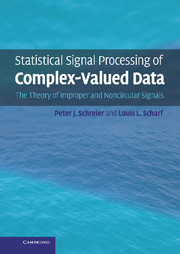Book contents
- Frontmatter
- Contents
- Preface
- Notation
- Part I Introduction
- Part II Complex random vectors
- Part III Complex random processes
- 8 Wide-sense stationary processes
- 9 Nonstationary processes
- 10 Cyclostationary processes
- Appendix 1 Rudiments of matrix analysis
- Appendix 2 Complex differential calculus (Wirtinger calculus)
- Appendix 3 Introduction to majorization
- References
- Index
8 - Wide-sense stationary processes
from Part III - Complex random processes
Published online by Cambridge University Press: 25 January 2011
- Frontmatter
- Contents
- Preface
- Notation
- Part I Introduction
- Part II Complex random vectors
- Part III Complex random processes
- 8 Wide-sense stationary processes
- 9 Nonstationary processes
- 10 Cyclostationary processes
- Appendix 1 Rudiments of matrix analysis
- Appendix 2 Complex differential calculus (Wirtinger calculus)
- Appendix 3 Introduction to majorization
- References
- Index
Summary
The remaining chapters of the book deal with complex-valued random processes. In this chapter, we discuss wide-sense stationary (WSS) signals. In Chapter 9, we look at nonstationary signals, and in Chapter 10, we treat cyclostationary signals, which are an important subclass of nonstationary signals.
Our discussion of WSS signals continues the preliminary exposition given in Section 2.6. WSS processes have shift-invariant second-order statistics, which leads to the definition of a time-invariant power spectral density (PSD) – an intuitively pleasing idea. For improper signals, the PSD needs to be complemented by the complementary power spectral density (C-PSD), which is generally complex-valued. In Section 8.1, we will see that WSS processes allow an easy characterization of all possible PSD/C-PSD pairs and also a spectral representation of the process itself. Section 8.2 discusses widely linear shift-invariant filtering, with an application to analytic and complex baseband signals. We also introduce the noncausal widely linear minimum mean-squared error, or Wiener, filter for estimating a message signal from a noisy measurement. In order to find the causal approximation of the Wiener filter, we need to adapt existing spectral factorization algorithms to the improper case. This is done in Section 8.3, where we build causal synthesis, analysis, and Wiener filters for improper WSS vector-valued time series.
Section 8.4 introduces rotary-component and polarization analysis, which are widely used in a number of research areas, ranging from optics, geophysics, meteorology, and oceanography to radar.
- Type
- Chapter
- Information
- Statistical Signal Processing of Complex-Valued DataThe Theory of Improper and Noncircular Signals, pp. 197 - 222Publisher: Cambridge University PressPrint publication year: 2010



